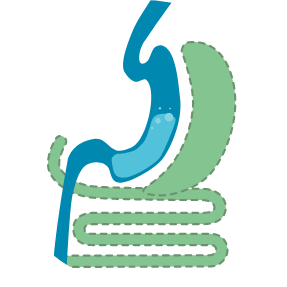
Our goal at Florida Coast Weight Loss Center is to help each of our patients achieve and enjoy a healthy life for the long term. Our bariatric surgeons perform duodenal switch weight loss surgery to help patients struggling with obesity empower themselves to lose weight and sustain their weight loss. We serve patients from Orlando, Jacksonville, Daytona Beach, and beyond.
What is Duodenal Switch Surgery?
Duodenal switch surgery, formally known as biliopancreatic diversion with duodenal switch (BPD), is a bariatric surgery procedure that takes a dual approach to weight loss. Duodenal switch surgery not only limits the amount of food a patient is able to eat (restrictive), but it also changes the way the body absorbs calories (malabsorptive). Duodenal switch surgery also changes the body’s production of the hunger hormone ghrelin, so patients should find it easier to manage cravings. More importantly, as described with the sleeve gastrectomy, this procedure also affects the production of several hormones involved in controlling your body’s weight set point through not just one, but two separate mechanisms.

How Does Duodenal Switch Surgery Work?
There are two stages to duodenal switch surgery.
Dr. Peterson uses the SADI-S approach for duodenal switch surgery. This involves only one connection (anastomosis) between the stomach and intestines, which helps reduce operative time and the risk of complications.
During the first part of the duodenal switch procedure, a sleeve gastrectomy (gastric sleeve) is performed. The stomach is divided vertically, and two-thirds of the stomach is removed. This is the restrictive portion of the procedure, and it reduces the size of the stomach to 8-10 ounces.
Immediately following the sleeve gastrectomy, the stomach is simply “unplugged” from the first part of the small intestine and “plugged” back in, approximately halfway down the length of the bowel. This allows food to empty into the mid portion of the small intestine. It is important to understand that no intestine is removed, nor is any intestine rearranged. We simply change where food enters the small intestine. Bypassing the first part of the digestive tract results in a decreased absorption of calories and nutrients.1
Who is a Candidate for Weight Loss Surgery?
The best way to determine if you are a candidate for duodenal switch or weight loss surgery is to consult with a bariatric surgeon and obesity expert. In general, candidates for duodenal switch surgery:
- Have a body mass index (BMI) of 50 or greater
- Have a body mass index (BMI) of 40 or greater with type 2 diabetes or other obesity-related health problems
- Are committed to a healthy diet and lifestyle for the long term

Are You a Candidate for Our Weight Loss Programs?
Take our 60 Second Assessment
Benefits of Duodenal Switch Surgery
For many of our patients, duodenal switch surgery is a life-saving procedure that not only helps them manage obesity but also treats or even cures dangerous health conditions associated with obesity. Benefits include:
- Suppressed appetite
- Eliminates the risk of dumping syndrome typically seen with the gastric bypass
- Effectively treat type 2 diabetes: more than 90% of duodenal switch patients achieve remission2
- Improved sleep apnea: up to 90% of patients can stop using their CPAP machine after surgery3
- Greater weight loss than gastric bypass or sleeve gastrectomy4
- Improved high cholesterol in more than 70% of patients5
- Improved high blood pressure in nearly 79% of patients6
What to Expect From Duodenal Switch Surgery
Preparing for Duodenal Switch Surgery
The first step in preparing for duodenal switch surgery is to have a private consultation with one of our bariatric surgeons. If you are deemed to be a good candidate for weight loss surgery, our team will help you prepare for the procedure and the necessary lifestyle changes. We will also help you work with your insurance company, conduct pre-operative health exams, and give you dietary guidelines to follow before your bariatric surgery and into your recovery.
The Duodenal Switch Procedure
Duodenal switch surgery using the SADI-S technique is performed under general anesthesia and is commonly done as an outpatient procedure. The first aspect of the procedure involves creating a gastric sleeve by removing approximately 80% of the stomach and shaping the remaining portion into a narrow tube.
Next, Dr. Peterson addresses the intestinal component of the procedure. The duodenum (the first part of the small intestine) is rerouted so that food bypasses a significant portion of the digestive tract and empties directly into the ileum (the lower part of the small intestine). This streamlined approach combines both aspects of the surgery into a single operative session.
In the second stage of duodenal switch surgery, the duodenum (the first part of the small intestine) is rerouted so that food empties into the small intestine and bypasses much of the digestive tract.

Recovery After Duodenal Switch
Recovery after duodenal switch surgery is very similar to patients undergoing a sleeve gastrectomy. You will typically be discharged on the same day of surgery and most return to approximately 80% of their daily activities within 5-7 days. Most of our patients are able to return to work 1-2 weeks after duodenal switch surgery, and can return to more extensive activity after 4 weeks. At the beginning of the recovery period, you will be restricted to a clear liquid diet, then you will gradually progress to soft foods.

Duodenal Switch Follow-Up & Aftercare
Follow-up and long-term aftercare is essential to success for duodenal switch bariatric surgery patients. You will work closely with our team as a member of our Finish Strong Program, which includes post-operative education and support.
The Finish Strong Program is a unique system based on the three pillars of health and wellness: nutrition, fitness, and lifestyle. During follow-up visits with various members of your support team, you will address any possible complications, monitor your medications, and monitor your nutrition including vitamin and mineral deficiencies. You will also have access to a holistic health and wellness team, including a health coach, nutritionist, and personal trainer.
Duodenal Switch Results
Weight loss after duodenal switch is rapid and sustained. In the first two years following duodenal switch surgery, the majority of our patients lose 60 to 80 percent of their excess body weight. Many patients maintain 70% excess body weight loss after 10 years.7
Duodenal Switch Surgery FAQs
Does insurance cover duodenal switch?
Many insurance companies cover some or all of weight loss surgery procedures such as duodenal switch, but understanding coverage details and pre-requisites can be difficult. Our experienced clinical team can help you understand your coverage options and we offer a helpful insurance check tool to find out more about what’s covered under your policy.
What if my insurance doesn’t cover duodenal switch surgery?
We partner with leading medical lenders to provide an affordable and convenient way to finance duodenal switch surgery. Low monthly payments mean that everyone can invest in their health, even without insurance.
How much does duodenal switch surgery cost?
The duodenal switch procedure costs $14,900 for self-paying patients. The team at Florida Coast Weight Loss Center is dedicated to making lasting weight loss within reach, regardless of your budget. Our financing options for self-pay patients offer duodenal switch surgery for all-inclusive monthly payments as low as $568* through a financing partner.
*Monthly payment amounts are estimates based on the assumption that the patient finances the entire cost of the surgery with no money down.
Is weight loss after duodenal switch permanent?
Duodenal switch surgery is designed to be a tool that helps patients lose weight and maintain their weight loss. While most patients do show sustained weight loss 10 years after surgery, success depends upon your commitment to a healthy diet and lifestyle.
What are the risks of duodenal switch surgery?
Duodenal switch surgery can help patients achieve and maintain long-term weight loss. Still, any surgical procedure comes with some risks and complications. Possible risks of duodenal switch surgery include:
- Vitamin and mineral deficiencies
- Anemia
- More frequent bowel movements
- Infection
- Internal bleeding8
What is the difference between traditional duodenal switch and SADI-S?
The SADI-S procedure (Single Anastomosis Duodeno-Ileal Bypass with Sleeve Gastrectomy) is a streamlined version of the traditional duodenal switch. It requires only one intestinal connection instead of two, which reduces the risk of complications while preserving the surgery’s effectiveness. Dr. Peterson exclusively performs the SADI-S technique at Florida Coast Weight Loss Center.
What is the difference between gastric bypass and duodenal switch?
The duodenal switch is a procedure that was essentially created out of the desire to create a weight loss procedure that optimized results while minimizing complications. The gastric bypass has long been known to potentially create many early and late complications. These include leaks, stenoses, bleeding, venous thromboembolic events (VTE), gallstone disease, marginal ulceration, internal hernia, and intussusception or telescoping of the bowel at the location of the bowel anastomosis.
And finally, some of the most underreported complications of RYGB is chronic abdominal pain and nausea/vomiting issues. The reasons for these complications are complex and poorly understood but can lead to significant decreases in overall quality of life. Extensive workup often is unable to identify a specific cause and exploratory surgery rarely is successful.
As you may have deduced, in our opinion, the gastric bypass is a flawed procedure that has potential complications that outweigh the benefits. It is still commonly used in patients who need to lose more than 100 pounds, however it is rapidly being replaced by the newer duodenal switch procedure. Not only has the duodenal switch been found to have far fewer complications, recent studies have demonstrated greater weight loss and better improvement in multiple obesity related diseases, especially Type II Diabetes when compared to the gastric bypass.
As surgeons, we always have to weigh the risk/benefit ratio as we discuss options with patients. Those procedures that have risks which clearly outweigh the benefits are typically not offered. There are also procedures that have benefits which outweigh the risks but the risk profile is so high that patients often elect to avoid these procedures.
Comparison of Weight Loss Options
| Sleeve Gastrectomy | Gastric Bypass | Duodenal Switch | Weight Loss Injections | |
| Lifetime Cost | $9,800 | $21,500 | $14,900 | $210,000* |
| Excess Weight Loss | 50-65% | 50-70% | 80-90% | 10-20% |
| Rate of Weight Loss | Faster | Fastest | Fastest | Slow to Moderate |
| Complications | Low | Moderate | Low | Moderate to High |
| Reversible | No | Partially Reversible | Partially Reversible | Yes |
| Outpatient Procedure | Yes | No (1-2 nights in hospital) | Yes | N/A |
| Time Off Work | <1 Week | 2 Weeks | <1 Week | N/A |
| Weight Regain | Yes | Yes | Less Likely | Yes |
| Convert Procedure to Another | Yes | Difficult | Yes | N/A |
*Calculation based on the average age of 40 for weight loss surgery patients and a life expectancy of 75.
Contact Florida Coast Weight Loss Center
If you are struggling with obesity and wish to consider weight loss surgery, the bariatric surgeons and support staff at Florida Coast Weight Loss Center are here to help. Contact us today to learn more about SADI-S duodenal switch surgery during a private consultation. We proudly serve patients from Orlando, Jacksonville, Daytona Beach, and surrounding communities.

1 Columbia Surgery. Duodenal Switch (PBD-DS). Available: https://columbiasurgery.org. Accessed May 17, 2022.
2 Cleveland Clinic. BARIATRIC SURGERY MAY CURE TYPE 2 DIABETES IN SOME PATIENTS. Available at: https://my.clevelandclinic.org. Accessed May 17 2022.
3 Marceau P, Biron S, Hould FS, Lebel S, Marceau S, Lescelleur O, Biertho L, Simard S. Duodenal switch: long-term results. Obes Surg. 2007 Nov;17(11):1421-30. doi: 10.1007/s11695-008-9435-9. PMID: 18219767. Available: https://pubmed.ncbi.nlm.nih.gov/18219767/. Accessed May 17, 2022.
4 Johns Hopkins Medicine. BPD/DS Weight-Loss Surgery. Available: https://www.hopkinsmedicine.org. Accessed May 17, 2022.
5 Buchwald H, Avidor Y, Braunwald E, Jensen MD, Pories W, Fahrbach K, Schoelles K. Bariatric surgery: a systematic review and meta-analysis. JAMA. 2004 Oct 13;292(14):1724-37. doi: 10.1001/jama.292.14.1724. Erratum in: JAMA. 2005 Apr 13;293(14):1728. PMID: 15479938. Available: https://pubmed.ncbi.nlm.nih.gov/15479938/. Accessed May 17, 2022.
6 Buchwald H, Avidor Y, Braunwald E, Jensen MD, Pories W, Fahrbach K, Schoelles K. Bariatric surgery: a systematic review and meta-analysis. JAMA. 2004 Oct 13;292(14):1724-37. doi: 10.1001/jama.292.14.1724. Erratum in: JAMA. 2005 Apr 13;293(14):1728. PMID: 15479938. Available: https://pubmed.ncbi.nlm.nih.gov/15479938/. Accessed May 17, 2022.
7 Columbia Surgery. Duodenal Switch (PBD-DS). Available: https://columbiasurgery.org/. Accessed May 17, 2022.
8 Johns Hopkins Medicine. BPD/DS Weight-Loss Surgery. Available: https://www.hopkinsmedicine.org. Accessed May 17, 2022.
The surgeons at Florida Coast Weight Loss Center have either authored or reviewed and approved this content.
Page Updated:
